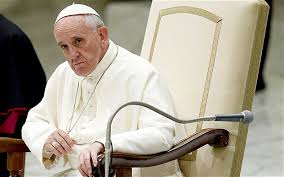 Pope Francis warned Vatican administrators Saturday that their work can take a downward spiral into mediocrity, gossip and bureaucratic squabbling if they forget that theirs is a professional vocation of service to the church.
Pope Francis warned Vatican administrators Saturday that their work can take a downward spiral into mediocrity, gossip and bureaucratic squabbling if they forget that theirs is a professional vocation of service to the church.
Francis made the comments in his Christmas address to the Vatican Curia, the bureaucracy that forms the central government of the 1.2-billion strong Catholic Church. The speech was eagerly anticipated given that Francis was elected in March on a mandate to overhaul the antiquated and oftentimes dysfunctional Vatican administration.
Already, heads have started to roll: Just last week, Francis reshuffled the advisory body of the powerful Congregation for Bishops, the office that vets all the world’s bishop nominations. He removed the arch-conservative American Cardinal Raymond Burke, a key figure in the U.S. culture wars over abortion and gay marriage, and also nixed the head of Italy’s bishops’ conference and another hardline Italian, Cardinal Mauro Piacenza, earlier axed as head of the Vatican office responsible for priests.
Other changes are on the horizon: In the coming weeks Francis will name his first batch of cardinals and in February will preside over the third summit of his “Group of Eight” cardinal advisers, who are expected to put forward a first round of proposals for revamping the Holy See bureaucracy.
Francis has said he wants a Vatican Curia that is more responsive to the needs of local bishops, who have long complained of Rome’s slow or unhelpful interventions in their work caring for souls. Francis has said he wants the church as a whole to be less consumed with moralizing than showing mercy to the needy, wherever they are.
Francis thanked the cardinals, bishops and priests gathered in the Clementine Hall for the Christmas address for their work, diligence and creativity. Deviating from his prepared text, he said “There are saints in the Curia!”
But he also reminded them that Vatican officials must display professionalism and competence as well as holiness in their lives.
“When professionalism is lacking, there is a slow drift downwards toward mediocrity. Dossiers become full of trite and lifeless information, and incapable of opening up lofty perspectives,” he said. “Then too, when the attitude is no longer one of service to the particular churches and their bishops, the structure of the Curia turns into a ponderous, bureaucratic customs house, constantly inspecting and questioning, hindering the working of the Holy Spirit and the growth of God’s people.”
Francis also repeated a warning he has issued on several occasions in his morning homilies at the Vatican hotel where he lives: an admonition against gossiping. The secretive, closed world of the Vatican is a den of gossip, as revealed publicly last year by the leaks of papal documents from then-Pope Benedict XVI’s butler.
Using terminology familiar to those present, Francis called for Vatican officials to exercise “conscientious objection to gossip.”
“Let us all be conscientious objectors, and mind you I’m not simply moralizing! Gossip is harmful to people, our work and our surroundings.”
Much gossiping of late has been focusing on the work of the two commissions of inquiry Francis named over the summer to advise him on reforming the troubled Vatican bank and rationalizing the Holy See’s overall finances and administrative structures.
Four big-name consulting firms — Promontory Financial Group, KPMG, EY and McKinsey & Co. — have been contracted for various projects.
USA Today

Leave a Reply
You must be logged in to post a comment.